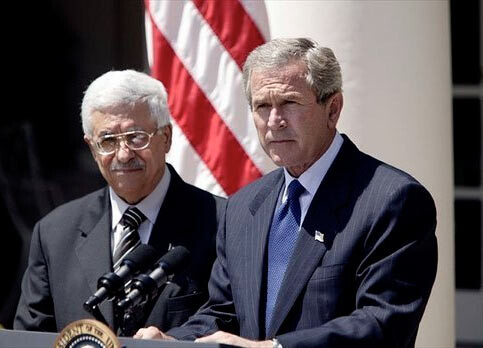International Crisis Group 24 May 2005

President George W. Bush and Palestinian Prime Minister Mahmoud Abbas hold a joint press conference in the Rose Garden Friday, July 25, 2003. (Whitehouse)
AMMAN/BRUSSELS — As their leader, Mahmoud Abbas, prepares to visit Washington on 26 May, Palestinians are watching for signals from the White House to help them decide whether he deserves their continued support.
Mr Abbas Goes to Washington: Can He Still Succeed?, the latest briefing from the International Crisis Group, examines the Palestinian President’s predicament. Although Abbas enjoys institutional and popular legitimacy for his agenda, that support will fade if his international partners fail to deliver on their commitments.
“Abbas has international support Yasir Arafat could only dream of”, says Crisis Group Senior Analyst Mouin Rabbani. “But he has until now been no more successful in changing Israeli policies or fundamentally altering the U.S. approach”.
Six months after his appointment as Chairman of the Executive Committee of the Palestine Liberation Organisation (PLO) and more than 100 days after his election as President of the Palestinian Authority (PA), Abbas has important achievements, including a significant reduction in Israeli-Palestinian hostilities and a gradual incorporation of the Islamist Resistance Movement (Hamas) into politics. But change has been slow and haphazard, a result of resistance by entrenched Palestinian elites and the glacial pace at which understandings reached with Israel are implemented.
Abbas’s legitimacy at home can only be sustained by results. Without change on the ground and tangible diplomatic progress, his difficulties will grow exponentially. He must show improvements in daily life. Mr Bush, who in January pledged the PA $200 million, should use the visit to say he seeks repeal of Congress’s restrictions diverting more than a quarter to Israel and depriving the PA of direct access to the rest.
Secondly, he must put the Palestinian house in order, notably by institution-building, genuine power-sharing, and rule of law. Palestinian legislative elections form the lynchpin of this process, but Abbas is under increasing pressure to delay them, which could undermine understandings he has forged with Hamas.
Thirdly, Israel must deliver on its commitments. That Israel has withdrawn from only two cities, released few prisoners, and maintains most checkpoints undercuts Abbas’s claim that engagement can achieve more than confrontation. And as Israel’s withdrawal from Gaza nears, Abbas needs more than U.S. words to arrest continuing settlement construction in the West Bank, especially surrounding Jerusalem.
“Abbas is coming to Washington to find out what kind of partnership is on offer”, says Robert Malley, Director of Crisis Group’s Middle East and North Africa Program. “If Washington genuinely intends to empower him, it should quickly provide concrete assurances regarding how it intends to resolve the Israeli-Palestinian conflict before the end of President Bush’s second term”.
More Information
Related Links